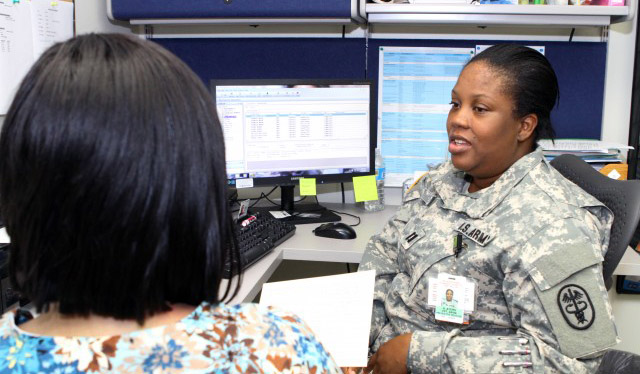
Ask the Flight Surgeon / By MAJ (Dr.) Roger Williams & CPT (Dr.) Gurdeep Buttar: Q: Doc, I go to my flight surgeon every few months to get checked for sexually transmitted infections. I have been treated three times in the last year for these infections and I was wondering how this could affect my flight status.
FS: From a military perspective, Sexually Transmitted Infections (STIs), have a significant impact on the medical readiness of individual service members and degrades force health protection. According to the Armed Forces Health Surveillance Branch, between 2010-2018, approximately 350,000 service members were diagnosed with an STI. The Army had the highest rates for chlamydia, gonorrhea, and genital herpes; the Navy had the highest rates of syphilis; and the Air Force had the highest rates of HPV. HIV rates have been relatively stable across the services from 2012-2017.

Capt. Anita Ayers, Army Public Health Nursing interim chief, and HIV-sexually transmitted infections educator, counsels a patient about the dangers of unprotected sex at the Preventive Medicine Outreach Clinic at RACH. The program sees Soldiers and other patients on a walk-in basis and STD testing can be done, if needed. For more information call 580-442-2061 or 580-558-3360. / Ben Sherman, Fort SillE
Military aviators are not spared from contracting these diseases and these infections are potentially dangerous in the flight environment. Many of these infections can look like more benign conditions, especially early on in their course. However, if not treated appropriately these conditions can distract a pilot and place crewmates’ lives in jeopardy. For example, syphilis’ signs and symptoms can be as seemingly nonthreatening as a rash, low grade fever, sore throat, headache, and fatigue, but become as serious as causing liver, joint, kidney, eye, and neurological issues if left untreated.
Local Risk
The communities we live in have risks associated with the way we work and play. The Army Public Health Center (PHC) evaluates the Army as a whole and each individual post to identify the risks within our community. The PHC’s Health of the Force (HOF) Report found that the rates of STIs are higher than in our civilian counterparts. Soldiers who have access to medical care and prevention, usually in the form of condoms and other barrier methods, should have lower rates. Furthermore, Soldiers should be pro-actively protecting their health; especially against diseases that currently have no cure like genital warts, herpes, and HIV. The report can be found at: https://phc.amedd.army.mil/Periodical%20Library/2018HealthoftheForceReport.pdf
Counseling
Patients with newly diagnosed STIs should be referred to the Community Health Clinic. The clinic staff will get a detailed sexual history to allow all exposed partners to be informed of possible infection and treatment options. The goal is not to embarrass or judge anyone but to ensure that the cycle of infection is broken and to stop the spread of disease. The Community Health Nurse may also allow Soldiers to notify partners personally. Online apps like https://dontspreadit.com allow for anonymous notification to partner’s cell phones.
Diagnosis and Treatment
Your doctor will usually collect urine or blood samples to verify that an STI is present. Treating the potential infection prior to the lab being completed is common. Soldiers are then directed to practice safe sex with a barrier method for at least a week after both partners are treated. Soldiers may also be informed that they should be vaccinated against the virus that causes genital warts.
Regardless of STI type, if you are on flight status, be prepared to be grounded while actively seeking treatment to monitor for side effects. In some instances, you may be required to obtain a waiver from your flight surgeon in order to maintain your status following your grounding period. Serious infections like HIV may result in the inability to perform duties or deploy. Also, repeated failure to prevent STIs may also be a reason for termination of flight status as this could indicate habitual poor decision-making processes that are not compatible with safety of flight.
Final Recommendation
The good news: STIs are preventable! Soldiers who present for recurrent or frequent STI testing should be counseled that unprotected sex is to be avoided. Many STIs are not treatable with immunizations or medications and can result in permanent infections. Women may have no symptoms of STIs and pass infections to partners unknowingly. STIs in women may also result in difficulty becoming pregnant in the future. These issues can take an emotional toll on both the Soldier and their partners. Soldiers should be evaluated for the need for immunizations against STIs. Genital warts, cervical cancer, and early PAP smear changes can be prevented with these immunizations. Protect yourself and educate your partner on the effects of STIs.
Fly safe!
Docs Williams & Buttar
Question for the Flight Surgeon?
If you have a question you would like addressed, email it to This email address is being protected from spambots. You need JavaScript enabled to view it.; we’ll try to address it in the future. See your unit flight surgeon for your personal health issues.
The views and opinions offered are those of the author and researchers and should not be construed as an official Department of the Army position unless otherwise stated
MAJ Roger Williams M.D. and CPT Gurdeep Buttar M.D. are flight surgeons at the U.S. Army School of Aviation Medicine, Fort Rucker, AL.






